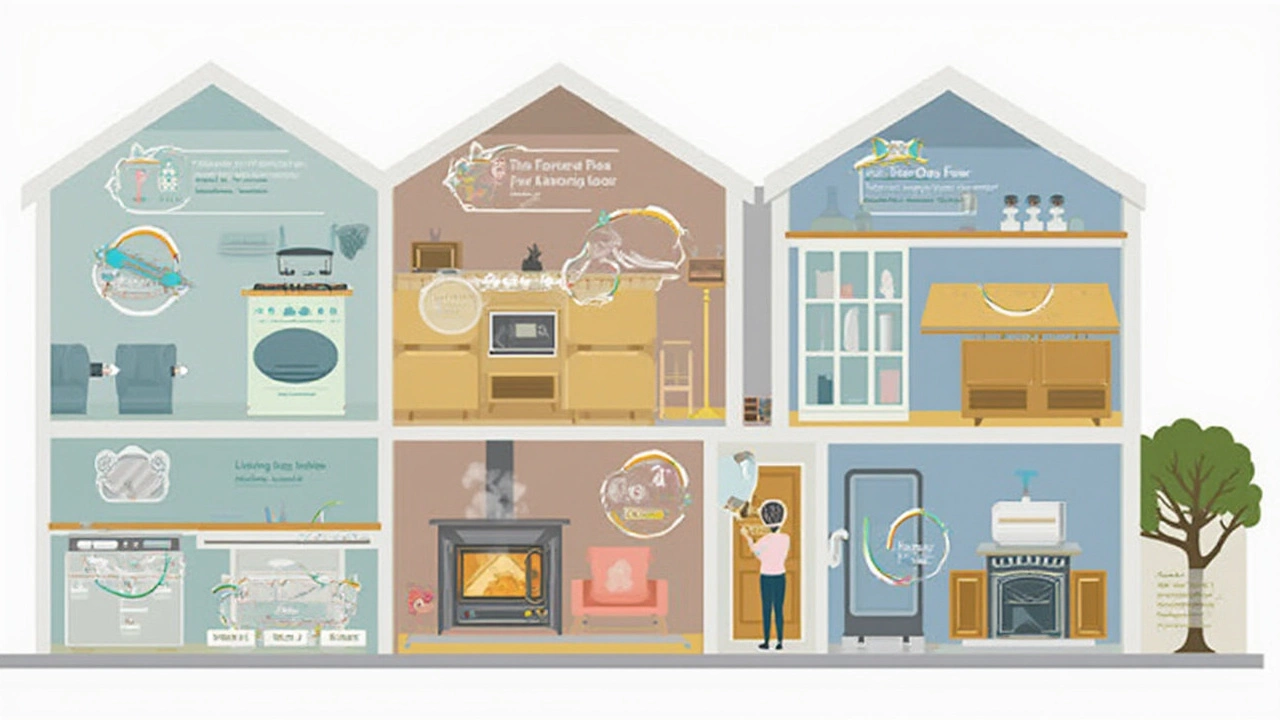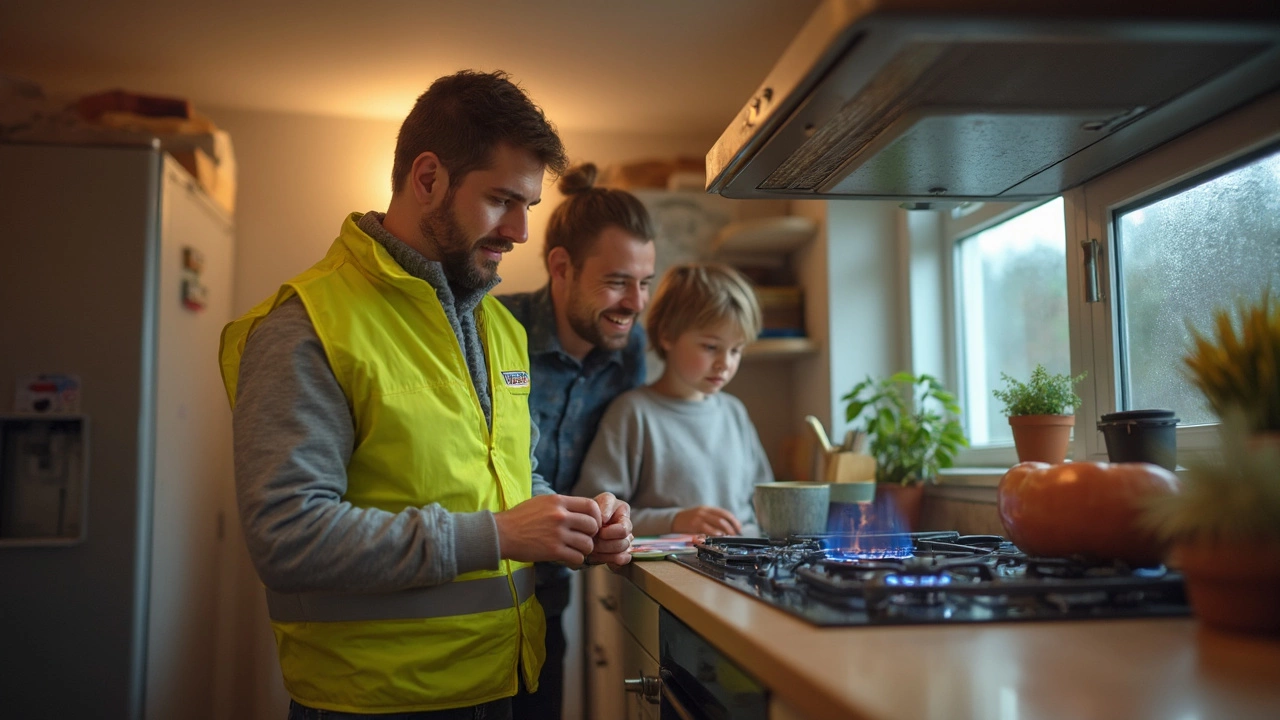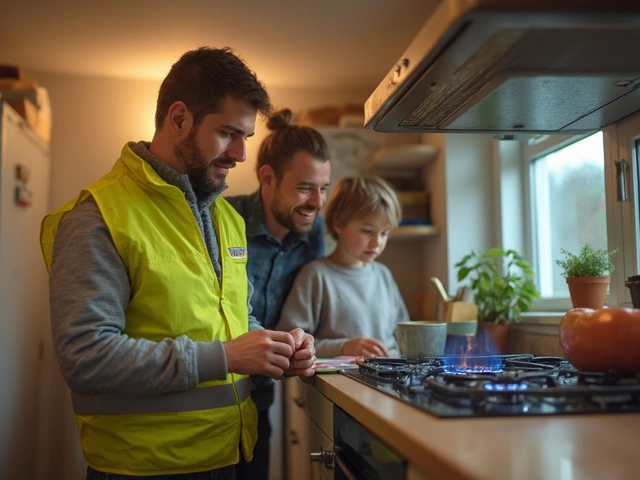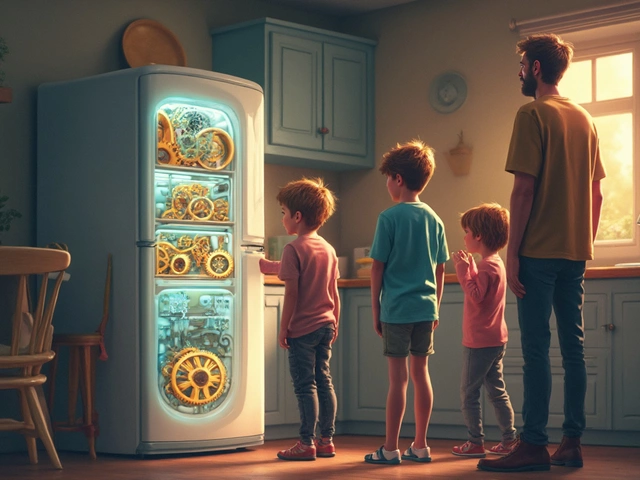If you’ve got gas appliances at home—a stove, boiler, maybe the trusty old water heater—chances are you don’t think about them much until there’s a problem. But skipping regular checks can mean trouble that's way worse (and more expensive) than a minor fix-up. Gas leaks, carbon monoxide poisoning, or even a busted appliance at the worst possible time—these risks just aren’t worth it.
Most folks have no idea how often to schedule those checks. You don’t have to guess, though. There’s actually a recommended schedule (yep, even if your gadgets seem to be running fine). Waiting for something to smell funky or click off randomly isn’t a safe bet. Not only does regular inspection help spot leaks or dodgy parts early, but it also keeps your appliances working efficiently and saves money on wasted gas.
- Why Regular Gas Checks Matter
- Recommended Frequency for Inspections
- Signs Your Gas Appliance Needs Attention
- Risks of Skipping Maintenance
- How to Prep for Professional Gas Checks
- Simple Habits to Keep Gas Appliances Safer
Why Regular Gas Checks Matter
It only takes one missed gas appliance problem to cause a big headache—or worse, something dangerous. A lot of folks think their gas stuff will just keep humming along until it ages out, but small issues can build up fast.
When you skip regular safety check routines, you’re actually letting hidden risks sneak up on you. Carbon monoxide, unlike gas leaks, has no smell at all, so most people don’t realize there’s a leak until someone starts feeling sick. According to the Centers for Disease Control and Prevention (CDC), about 430 people die in the U.S. each year from accidental CO poisoning. That’s not just from faulty heating, either—ovens, dryers, and water heaters play a role.
- Maintenance checks can catch corroded pipes or broken seals before they cause leaks.
- Early spotting of cracks in burners or hobs means fewer emergency callouts or repairs.
- Proper checks help gas burn more cleanly, lowering those bills and reducing indoor air pollution (yes, burning gas actually gives off a bit of indoor smog).
And don’t forget: insurance companies often ask for proof of regular check-ups if you ever file a claim for gas-related damage. Miss the schedule or lose the service receipts, and you might end up footing the bill yourself. Staying on top of a regular inspection schedule isn’t just for peace of mind—it’s practical, saves money, and keeps everyone safer around your home.
| Gas Appliance Issue | Chance of Severe Damage (if left unchecked) |
|---|---|
| Leaking connection | High |
| Worn-out hose | Medium |
| Blocked vent or flue | High |
| Dirty burners | Medium |
Recommended Frequency for Inspections
If you’re like most people, you probably wonder how often your gas appliance should actually be checked. It matters more than you think—staying on the safe side isn’t just smart, it helps your wallet in the long run. For homes, the safe bet is to have a pro inspect your appliances at least once a year. That’s the standard most gas companies recommend, including the folks at the Gas Safe Register.
"An annual gas safety check is a legal requirement for landlords and a wise move for homeowners." – Gas Safe Register
So, the magic number here is once a year. Put a reminder in your calendar and don’t skip it, even if nothing feels wrong. Gas boilers, cooktops, and water heaters are all covered here—anything running on gas should go on your mental checklist.
If you’re renting, British law makes it super clear: the landlord must organize a yearly safety check. In the US, it’s not a legal must-have everywhere, but energy experts and local fire departments strongly recommend it because gas leaks and carbon monoxide don’t mess around.
| Appliance Type | Recommended Inspection Interval |
|---|---|
| Boiler | Every 12 months |
| Gas Water Heater | Every 12 months |
| Furnace | Annually |
| Gas Stove/Oven | Annually |
New appliances usually come with a manufacturer’s guide. Sometimes, they’ll want a first check after the first year, then annual after that. Miss your yearly appointment and you might lose your warranty—plus, if you get a surprise inspection (think insurance or rental checks), you’ll want a paper trail showing you kept up.
If you start smelling gas, hearing odd hissing sounds, or your flame’s burning yellow instead of blue, don’t wait for the annual check. Call a licensed pro ASAP. But as a general rule, stick to a once-a-year maintenance and inspection schedule to keep everyone safe and your gas bill reasonable.
Signs Your Gas Appliance Needs Attention
Your gas appliance is one of those things you want to work quietly in the background. But when it starts throwing out warning signs, you don’t want to ignore them. Spotting issues early can keep your home safe and save you a lot of money down the line. Here’s what you should keep an eye (and nose) out for:
- Strange smells: Ever get a whiff of rotten eggs? That’s usually added to gas so you can sniff out leaks fast. Even a faint smell means it’s time to shut things down and call in an expert, no guesswork here.
- Pilot light problems: If your pilot light or burner flame isn’t blue and steady (think yellow, orange, or flickery), your appliance probably isn’t burning gas safely. That could mean carbon monoxide’s getting into your home instead of venting outside.
- Unusual noises: Clicking, banging, hissing, or popping sounds aren’t normal. That’s your gas appliance asking for help before something goes seriously wrong.
- Soot or discoloration: See black marks or stains around your appliance, burners, or vents? Soot build-up usually means gas isn’t burning cleanly, which ups the risk for even bigger issues.
- Higher gas bills: Sudden spikes in your bill, even though you haven’t changed your habits? That can signal a leak or an appliance that’s working way too hard and eating up gas inefficiently.
- Dampness or condensation: Extra humidity nearby (like on windows or walls) could mean your appliance is venting poorly, which lets dangerous gases build up indoors.
- Symptoms at home: If people or pets start feeling dizzy, tired, or get headaches that clear up when you go outside, that can be an early warning of carbon monoxide exposure, not something you want to brush off.
Check out this handy table for a quick overview of red flags you might spot:
| Warning Sign | Possible Cause | Action |
|---|---|---|
| Rotten egg smell | Gas leak | Shut off and call for help |
| Yellow/orange flame | Incomplete combustion | Inspection needed |
| Sudden high bills | Leak or inefficiency | Get it checked out |
| Unusual sounds | Faulty part | Schedule repair |
| Soot/discoloration | Poor combustion | Service required |
Don’t wait for obvious trouble. If your gas appliance is flashing even one of these signs, time to be safe and get a pro to check it out.

Risks of Skipping Maintenance
Skipping a regular gas appliance check isn't just taking a gamble with your stovetop. The real issues sneak up when you least expect them—sometimes with deadly consequences. One of the scariest risks is a gas leak. Even a tiny leak can turn your kitchen or living room into a dangerous place, setting the stage for fire or even explosions. In Australia, gas incidents land hundreds of people in hospitals every year, and that’s not counting the close calls.
Another big risk? Carbon monoxide. This invisible, odorless gas comes from incomplete combustion inside appliances that haven’t been checked or maintained. It creeps through your house without much warning. According to Healthdirect, about 50 people in Australia are hospitalized yearly because of carbon monoxide poisoning—most from household appliances that looked fine on the outside. Early symptoms can just feel like a flu (dizziness, headache, nausea), so people ignore them until things get serious.
Missed services also mean a bigger hit to your budget down the line. Dirty or faulty parts force your gas appliances to work overtime, burning more fuel and running up your bills. Plus, small fixes that get ignored today can turn into expensive, whole-appliance replacements later.
- Gas leaks increase fire or explosion risk.
- Carbon monoxide is a silent hazard—symptoms often get missed.
- Unserviced appliances lead to lower efficiency and higher fuel costs.
- You might void your manufacturer warranty for not following the recommended maintenance schedule.
| Type of Incident | Potential Outcome | Common Cause |
|---|---|---|
| Gas Leak | Fire, Explosion, Illness | Worn seals, loose connections |
| CO Poisoning | Headache, Nausea, Death | Poor ventilation, blocked flues |
| Efficiency Loss | Higher Bills, Breakdowns | Clogged burners, dirty parts |
Those missed safety checks are simply not worth the risk to your home or family. If you rent, you’re not off the hook either—landlords are required by law to get gas appliances serviced at set intervals. So whether you own or rent, keeping up with inspections should be non-negotiable.
How to Prep for Professional Gas Checks
So, you’ve booked a gas appliance inspection and want it to go smoothly? Good call. Getting ready ahead of time not only makes the technician’s job easier but can also help you catch issues you might have missed.
- Clear the area: Make sure the space around every gas appliance is easy to access. Move things like boxes, laundry baskets, or any clutter blocking boilers, stoves, or heaters. Technicians need space to work safely and see all the connections.
- Find your paperwork: If you’ve got manuals, previous inspection records, or repair receipts, have them handy. These can give the pro useful info and may speed up the process.
- Know your symptoms: Noticed strange smells? Appliances making weird noises or pilot lights going out? Jot down anything unusual, even if it seems minor. This helps the technician target their inspection and fix trouble spots fast.
- Secure pets: If you’ve got dogs or curious cats, keep them away from the work area. It avoids distractions, and your pets won’t accidentally get hurt or sneak out the door.
- Plan for a walkthrough: Most pros want to see all your gas appliances—not just the one acting up. Be ready to show them where each is, including any in the garage, basement, or outside.
Something most people don’t realize: The average full-home gas check with a certified tech usually takes 45-90 minutes, depending on how many appliances you’ve got. If you have more than three gas appliances, expect to be done closer to the high end of that range.
| Appliance Type | Prep Tip |
|---|---|
| Boiler | Turn off the unit an hour before the check. |
| Stove | Wipe surfaces to spot any recent leaks or spills. |
| Water Heater | Clear items nearby for easy access to fittings. |
If your gas appliance is built into cabinetry or surrounded by storage, consider pulling it out or clearing the cabinets if you’re able. Some techs need to see pipes and vents at the back, not just the front panel. Quick prep makes for a smoother and more thorough safety check, lowering the odds you’ll need a second visit for missed issues.
Simple Habits to Keep Gas Appliances Safer
Keeping your gas appliance safe doesn’t have to be complicated. A few everyday habits can drop your risk of gas leaks and knock out small issues before they balloon into big ones.
- Check for strange smells regularly. Natural gas is given a “rotten egg” odor for a reason. If you ever catch that scent, turn off the appliance and call a pro.
- Look for soot or yellow flames. Your gas flame should be blue. Yellow or orange hints incomplete burning, which can mean carbon monoxide. Soot stains can also mean trouble with your gas appliance or venting.
- Keep vents clear. Blocked vents trap dangerous gases inside. Dust them off and don’t stack things near your water heater, stove, or boiler.
- Listen for weird noises. Banging, popping, or clicking from your appliances aren’t just annoying—they can be warning signs of loose or broken parts.
- Test your carbon monoxide detector each month. Cheap insurance for your family, honestly. Replace the batteries twice a year just to be safe.
- Don’t skip your annual safety check. Make it easy by sticking a reminder on your fridge or a digital one on your phone. If you rent, ask your landlord about their maintenance schedule.
Here’s a practical snapshot showing how some simple stuff can make a difference:
| Habit | Risk Reduced |
|---|---|
| Checking for gas smell | Gas leaks, fires |
| Blue flame monitoring | Carbon monoxide exposure |
| Clearing vents | Vent blockages, gas buildup |
| Testing detector | CO poisoning risk |
The more you pay attention and act fast, the less you’ll need those “panic calls” to the repair guy. Make these moves routine and your gas appliance will run longer and safer—guaranteed.





